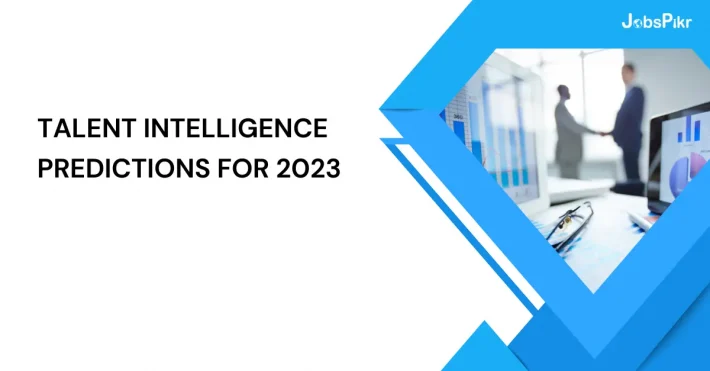Talent Intelligence (TI) and its necessity have been proven over the past decade. As leaders plan for the future, transformation in all areas of operations – including human resources is inevitable. Talent Intelligence predictions combined with Internal data knowledge and access to labor market insights help shape business strategies that support long-term growth.
In a recent report by Fortune Business Insights, the global talent intelligence software market valued at $7.93 billion in 2022 is expected to reach $17.6 billion by 2029 with a CAGR growth of 12.1 percent during the forecasted period. The sector is seeing new trends and developments in innovation and automation due to increased investment and a larger user base.
Although 2022 has seen its fair share of turbulence through tech layoffs and other global movements on changing working conditions, it has also sparked conversations on how to enhance employee experience, retention, and overall work environment through Talent Intelligence practices.
Managing the Aftermath of 2022 with Talent Intelligence Predictions
In the past few months, the HR sector has seen discussions about the impact of layoffs in the tech industry, paired with concerns about a potential recession due to factors such as rising inflation and high fuel costs. Though most layoffs have been concentrated in the tech sector, their impact isn’t necessarily felt only in that industry.
Big-name companies such as Shopify and Amazon, have let go of employees in the thousands – especially in the human resources department. Shopify made redundant, several HR employees (some reports claim the company has dissolved the entire Talent Intelligence team) while Amazon plans to lay off 18,000 workers in the devices organization, retail division, and HR department.
In times of such adversity, it is imperative to learn how to make the most of a tough situation – for leaders and HR teams alike – by minimizing damage to employee morale and their well-being. It is also important to not lose sight of effective talent planning and make it a crucial part of the strategy, especially during an economic downturn.
While it is easy to put aside and focus on other important areas or departments of the business, organizations must deal with the aftermath of layoffs by addressing issues on team restructuring, role changes, and added responsibilities. Talent Intelligence can assist in mitigating the impact of layoffs by identifying internal talent – through analysis of skills and experience – and providing them with the appropriate development opportunities to fill skill gaps.
Let’s explore the resilience of the Talent Intelligence function in a tough climate and several other ways it can help navigate it.
2023 Talent Intelligence Predictions
Employee Retention
Forbes has declared employee retention as the No. 1 issue for employers in 2023. With staggering numbers of layoffs across companies, its ripple effects are bound to be felt by employees who make the cut. Not only that, following the pandemic workers everywhere, are looking for healthy job environments with a good career progression to feel fulfilled. Talent Intelligence data coupled with labor market insights can help with
- Career mapping (charting out career progression with skills, certification & experience required to climb the ladder)
- Highlighting any organizational shortcomings (wage inconsistencies, lack of diversity) and
- Iron out areas/practices of concern (low employee engagement, work overload leading to burnout, lack of two-way communication)
that may leave employees unfulfilled and out the door.
Career Mapping and Internal Mobility
As stated above, there is an ever-increasing importance to retain employees. This is driven in part by a growing awareness of the impact of disengaged and disenchanted employees on organizational performance through recent global movements such as the Great Resignation and Quiet Quitting. Companies now must create a positive and fulfilling work environment to retain well-performing employees and attract top talent.
Creating divisive career maps for the workforce by ensuring individuals with relevant skillsets and experience can be moved to new roles is necessary to promote internal mobility. Both approaches facilitated by Talent Intelligence are effective to ensure people don’t feel their careers stagnating and moreover improve satisfaction levels – especially in a tough market.
Prioritizing DE&I
Prioritizing Diversity, Equity, and Inclusion (DE&I) creates a healthy environment wherein individuals from diverse cultures, demography, and experiences have space to co-exist together. For organizations spread across multiple geographies, Talent Intelligence can negate any predisposed bias and help create and foster a diverse workforce that’s accommodating to everybody.
Identifying and Inculcating Relevant Skills
A recent Harvard University study suggests as much as 80 percent of an individual’s achievements throughout their career are determined by soft skills leaving only 20 percent to hard skills. TI can provide the means to assess new hires and current employees based on existing skills vs those lacking, to fuel decisions on selection or further training. In this regard, individuals can be identified for upskilling or reskilling, and that data can be used for promotions in seniority or reassigning to a suitable role i.e., internal mobility.
Bridging the gap with AI
Several businesses have leveraged AI-assisted technologies to improve the experience of the candidate and employee journey. One such use is via Talent Intelligence as most platforms available in the market have cutting-edge software running on AI. In an economic downturn, companies must prioritize roles to hire and ensure the caliber of their existing workforce is good enough to be productive and drive business.
Conclusion
Maintaining Talent Intelligence is crucial for a company’s long-term success as it ensures the workforce’s performance doesn’t dip and reduces employee turnover. While it may require some costs and resources, the benefits of keeping Talent Intelligence outweigh any potential drawbacks, especially in today’s dynamic market where the individual’s expectations and needs are constantly changing.
Additionally, in recent years, the workforce’s expectations have evolved, and it is important for companies to adapt, be aware of ways to optimize internal systems and resources, to attract and retain top talent.



